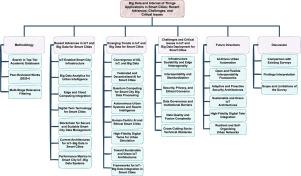智慧城市中的大数据和物联网应用:最新进展、挑战和关键问题
IF 7.6
3区 计算机科学
Q1 COMPUTER SCIENCE, INFORMATION SYSTEMS
引用次数: 0
摘要
物联网(IoT)和大数据的融合推动了现代城市的快速城市化,实现了交通、能源、医疗保健和公共安全领域的实时监控、预测分析和智能自动化。该调查系统地回顾了物联网基础设施、大数据分析、边缘和云集成、数字孪生技术和区块链的进展,以实现安全和可扩展的数据管理。文献选择侧重于2020年以后发表的同行评议作品,优先考虑提出具体智慧城市部署或技术框架的期刊和会议论文。对每个技术领域的操作效益、局限性和在实现弹性城市生态系统中的作用进行了审查。新兴趋势,如支持6g的物联网、联邦学习(FL)、量子计算和群体智能,在其成熟度、当前研究重点和未来影响方面都有明确的背景。为了解决持续存在的挑战,包括可扩展性瓶颈、互操作性差距、网络安全威胁和数据治理问题,该调查确定了可操作的方向,如地理空间数据标准化、能源感知编排和轻量级共识机制。这些有针对性的措施为指导未来安全、高效、以人为本的智慧城市发展的研究和实践奠定了基础。本文章由计算机程序翻译,如有差异,请以英文原文为准。

Big data and Internet of Things applications in smart cities: Recent advances, challenges, and critical issues
The rapid urbanization of modern cities has been propelled by the convergence of the Internet of Things (IoT) and Big Data, enabling real-time monitoring, predictive analytics, and intelligent automation across transportation, energy, healthcare, and public safety. This survey systematically reviews advancements in IoT-enabled infrastructure, Big Data analytics, edge and cloud integration, digital twin technology, and blockchain for secure and scalable data management. The literature selection focused on peer-reviewed works published from 2020 onward, prioritizing journal and conference papers that present concrete smart city deployment or technical frameworks. Each technological domain is examined with respect to its operational benefits, limitations, and role in enabling resilient urban ecosystems. Emerging trends such as 6G-enabled IoT, federated learning (FL), quantum computing, and swarm intelligence are explicitly contextualized in terms of their maturity, current research focus, and prospective impacts. To address persisting challenges, including scalability bottlenecks, interoperability gaps, cybersecurity threats, and data governance issues, the survey identifies actionable directions such as geospatial data standardization, energy-aware orchestration, and lightweight consensus mechanisms. These targeted measures provide a foundation for guiding future research and practice toward secure, efficient, and human-centric smart city development.
求助全文
通过发布文献求助,成功后即可免费获取论文全文。
去求助
来源期刊

Internet of Things
Multiple-
CiteScore
3.60
自引率
5.10%
发文量
115
审稿时长
37 days
期刊介绍:
Internet of Things; Engineering Cyber Physical Human Systems is a comprehensive journal encouraging cross collaboration between researchers, engineers and practitioners in the field of IoT & Cyber Physical Human Systems. The journal offers a unique platform to exchange scientific information on the entire breadth of technology, science, and societal applications of the IoT.
The journal will place a high priority on timely publication, and provide a home for high quality.
Furthermore, IOT is interested in publishing topical Special Issues on any aspect of IOT.
 求助内容:
求助内容: 应助结果提醒方式:
应助结果提醒方式:


